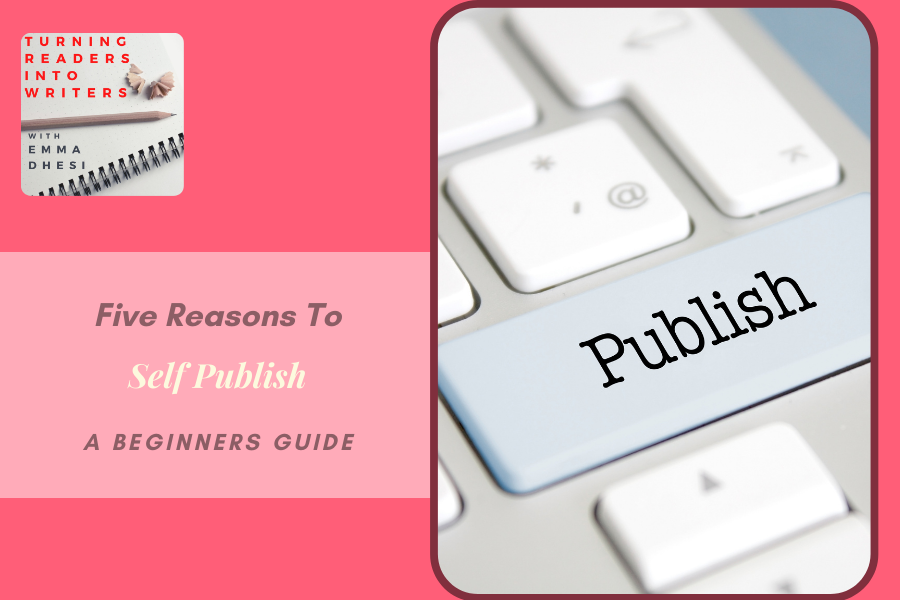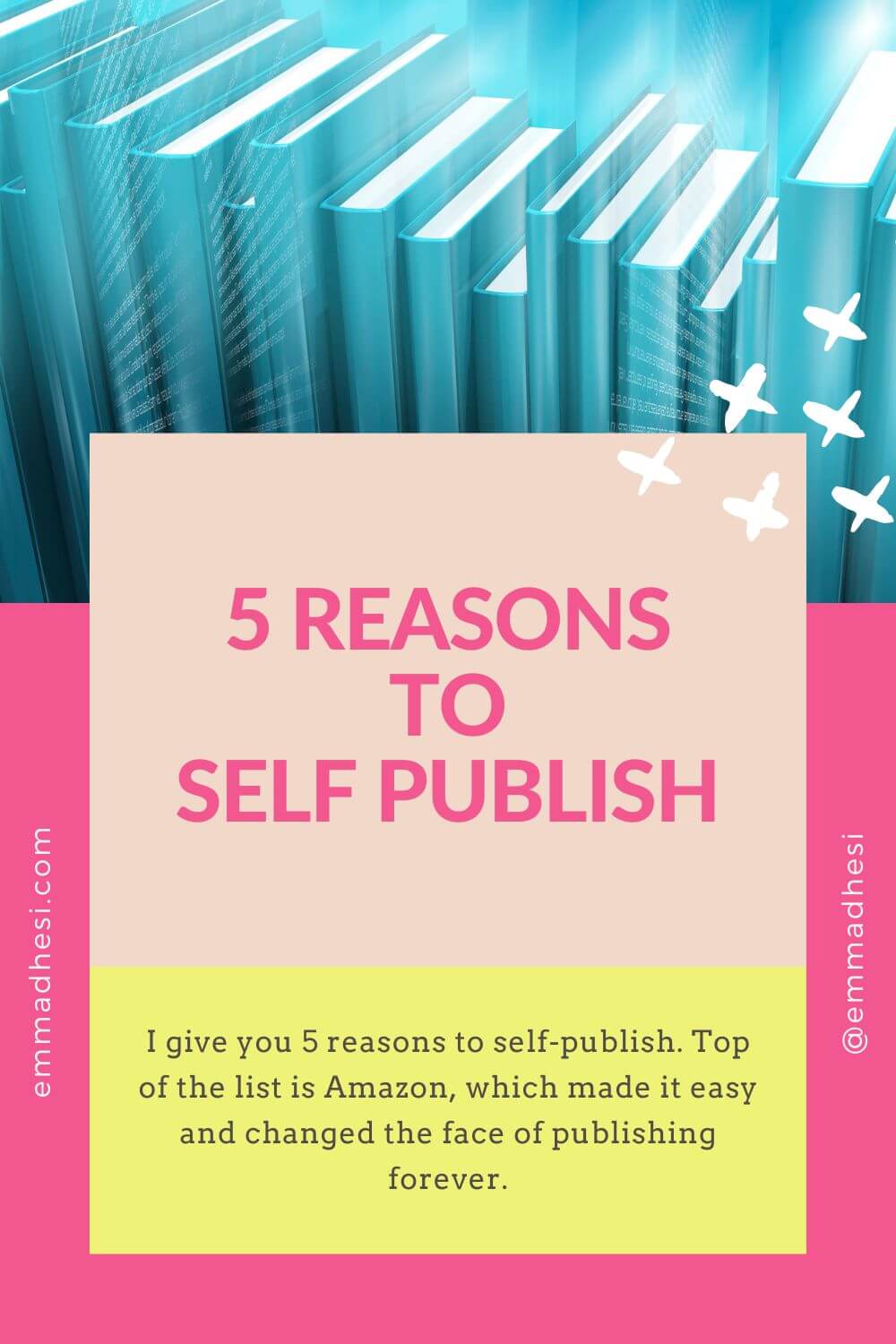I’m going to give you 5 reasons to self-publish.
If you’re at the beginning of your writing journey, you most likely have dreams of signing to one of the big five publishers.
You visualise your book advertised on huge billboards, on the side of buses and in train stations across the country.
You imagine your book on the table at the front of Waterstones, along with a prominent window display featuring your face and multiple copies of your book.
That’s certainly the dream I always had, and why not?
1. Amazon
But then along came Amazon, which changed the face of publishing forever and will undoubtedly be the leader in any future changes. But for now, they, and several other platforms, offer writers not only the opportunity to get their books on sale but also the chance to build a business.
I’ve thoroughly researched the pros and cons of both traditional and self-publishing so, if you’ve ever thought about indie-publishing your work, here are five reasons to really consider self-publishing:
- Authors traditionally published receive less than 15% profit from their book sales. Agents, publishers and Distributers all take their cut from the sale price. Indies get 70%.
- Authors lose control of the rights to their work for the duration of the contract. That usually includes paper rights, electronic rights, audio rights and all translation rights. If you’re a debut author with no clout, you don’t get a say.
- Authors have no control over the editorial of their work, nor the cover design. If you don’t like what the publisher chooses, tough luck.
- Debut authors get no marketing budget. You still have to publicise your novel.
- If you are already a business owner, you might as well run this business too!
2. Not an Amazon fan? I’ve got you covered.
Amazon is not the only player online. Scott Allen from selfpublishing.com listed some of the best online publishers:
- Kindle Direct Publishing
- Barnes & Noble Press
- Kobo
- Apple Books
- Self-Publishing School
- Reedsy
- IngramSpark
- Publish Drive
- Draft2Digital
- Smashwords
- Streetlib
Allen says in his article that no two publishing platforms are the same and he strongly recommends you do your due diligence to discover which one aligns best with your way of working.
Allen also takes you through who the publishers are and what their role is in your business. He flags up some of the common terminology you should get used to and then takes you through each of these twelve publishers.

3. Self-publishing is not vanity publishing
In addition to all these practical reasons, I also had a mindset shift. Independent publishing (another term for self-publishing) is not the same as vanity publishing. Indie authors worth their salt have their books professionally edited and hire someone to create a professional book cover to rival any covers you’ll see in the bookshops.
The days of throwing any old rubbish onto Amazon and hoping it sells have gone. Competition for sales is fierce and, ultimately, if your book isn’t any good, nobody will buy it!
4. Market your books for you, not for a publisher
Unfortunately, the days of leaving all the promotion and publicity in the hands of the publishers marketing team have gone. Even the likes of Stephen King, JK Rowling and Lee Childs have to do their fair share of marketing. Even if you are published by one of the big houses, you’re still expected to do most of the marketing yourself.
Debut authors get a tiny marketing budget. Your publisher might organise a couple of events for you if you’re lucky, but that won’t be enough to sell all the books you’ll need to sell to recoup your advance.
You’ll still need to arrange publicity for yourself. That means going to local bookshops to do readings, Q&As and signings. That also means going to libraries – and I don’t mean the British Library! – and doing readings in cold, pokey rooms.
You’ll also need an online presence. My blog post Do Fiction Writers Need A Platform, outlines just why this is so important and how you can start building your online presence. Ultimately, it’ll be your job to let readers know you and your book exist.
It’ll be up to you to let people know if your book’s on sale or part of a group offer. You’ll need to find podcasters to interview you and you’ll have to approach newspapers or magazines to do a feature on your book and get it reviewed in the local press.
Mark Dawson is the poster boy for self publishing and in the clip below he shares his own experience of being a debut novelist with a traditional publisher.
5. Global Reach
It took me a while to realise this, but when a book is e-published, it’s sitting on a global bookshelf, not just the bookshelf in my local Waterstones. The US is the biggest English-speaking market, and after the US comes India and China.
As Isadora Felix writes, if she wants to sell in Japan or Mexico, she can. She doesn’t have to print and send stock, wait years for the publisher to agree a contract and she will retain the bulk of the earnings.

Do you need an author website?
As part of my research into the indie publishing world, I’ve discovered that having an author website is a vital part of your author career. Even if you’re unpublished. Read here to find out how to get started.
This is the right time to self publish
What I’m saying is – the world is your oyster!
Be prepared for change
You’ve already seen just how much the publishing industry has changed in the last ten years or so – and it’s still evolving. Audio is a booming market, with millions of us turning to podcasts and audiobooks, something that is only going to continue as AI becomes commonplace.
When Jericho Writers speculated on the likelihood of the future consolidation of the existing traditional publishing houses, they determined it is 100% likely.
This means it will be even more difficult for new writers to break through into traditional publishing. It will be pot luck as to whether you fit what publishers think readers want. It will be a lightning strike to be their debut novelist who hits upon the zeitgeist and has that breakout novel.
Jericho Writers also speculate that the majority of traditionally published authors will look for hybrid book deals. This isn’t surprising when you learn the average author earns only £10,000 a year. That sum isn’t enough to live on and is one of the reasons why so many authors have a day job and only write in their spare time!
Opportunity knocks
We are so lucky to be writing in the digital age. As an indie author you get to decide the length of your book, its title, the cover design and pricing. You even decide the markets in which you sell.
You are the boss. You have control.
You’ll be a true Authorpreneur and will build a sustainable income for you and your family. That is something you could not even have dreamed of 30 years ago.
